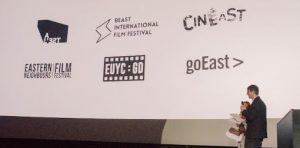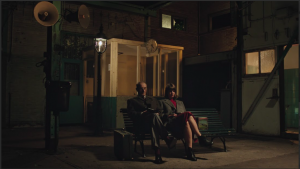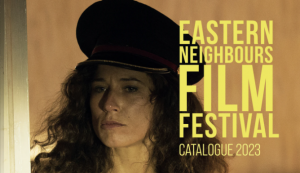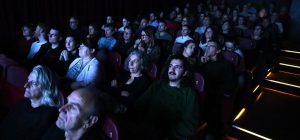Interview with the Director of No Smoking in Sarajevo
Back to the Future with ‘No Smoking’ Band
ENFF brings an exclusive interview with the director of No Smoking in Sarajevo, Gianluca Loffredo who tells about his passion for Yugoslavian music, his trustful relationship with the band members and his interest in the collapse of socialism political systems. A special screening will be held on May 21st at 19:00 hours in Rialto, Amsterdam. Read more about ENFF On Tour event here.

When did you first hear their music the Yugoslavian ‘No Smoking’ (Zabranjeno Pusenje) band and what made you interested?
I heard about them for the first time from my journalist friend Andrea Postiglione some eight years ago. Together we started looking for funding in order to make our first field trip and to investigate if there was a base to create this documentary.
At first I got attracted to this classic story of two rock band leaders who split, like Lennon and McCartney from the Beatles. What teased me even more was the fact that the rock band split in two different bands with the same name. That was the trigger that motivated me to shoot the documentary. I started by listening to their music and studying the song lyrics through the few English and Italian websites that translated some of their songs.
How did their messages reach you considering the fact their lyrics are in a foreign for you language?
The study of their music lasted three years. I worked with the interpreter of the film Gala Ivkovic who translated for me every single song of their 30 years-old career and for three years I have been waking up every day with a different ‘Zabranjeno Pusenje’ song. So now I am able to sing them (and I do during their concerts) and to understand the meaning in depth.
In any case, I did a serious research on their lyrics before filming and editing, and that effort has been recognized and appreciated by the band members after they have seen the film.
Why did you decide to make a film about the band and was it difficult to finance it?
The thing that interested me at first was the possibility to talk about former Yugoslavian history from a different perspective, with black humor and music. But that eight-years-long project became a part of my life much more that I imagined, so it turned to be personal.
After three years of looking for funding (in Croatia, Bosnia, Serbia and Italy) without any success, I was about to abandon the idea. Luckily, just few months after my decision, I met Grenouilles Productions in France that believed in the project and thanks to France 3 Corse, National and BHRT 1 we finally found the money to make the film.
How did you approach the characters, was it easy to make them participate in the film?
I was first in contact with Sejo through my journalist friend Andrea. He was happy that some Italian director was interested in telling their story as a metaphor of former Yugoslavia but I assume that the prolonged time before really starting gave him some doubts.
After we first met he was very responsive and gave me Zenit´s telephone number, so I was could meet him in Sarajevo. Then with the help of a Croatian documentary production company I reached Nele by email and he also agreed to participate to the film.
The complicated part was not to make them participate (even if they had to show up together) but to explain that it was not simply an “Italian/French documentary”. Convincing them that I had a deep and emotional interest in their authentic story and that they shouldn’t treat me just as a foreigner, was the most difficult part. It took time, rakjias and a lot of conversations to gain their trust.
So are you friends now?
Yes, I can say that we are friend now. Such a long project could not be possible without a deep trust. And four years together (even if not meeting every day) is a very long time in which every one of them could see how profoundly interested I was in the subject, and that this project was more then just “a job” for me. We still talk to each other and I am waiting for the next possibility to meet. They all know that my house in Naples is always open for them but for the moment just one member of the band visited me during his holidays.
I highly estimate their artistic work and I really appreciate them as individualities. I found a little part of myself in each of them, maybe that’s why I was able to complete this film.
Which is your favourite band among the three new branches – the Serbian, the Bosnian and the Croatian one?
Now the only branch which still makes music is the Croatian one, so it’s easy to say that I like them the most. However, everybody in former Yugoslavia will tell you one same thing and I can’t do it differently: the best ‘Zabranjeno Pusenje’ band is the Yugoslavian one.
This is not just a music documentary, it is a portrait of a post-war society. What provokes your interest in the post-Yugoslav situation?
I would rather define it as a music documentary which talks about friendship in a post-war society.
As an Italian I remember that war and I always considered Yugoslavs as neighbours. In addition to that I studied Political Science at the university including a lot the Eastern European history. I have been always interested in the end of socialist regimes and the global arrival of capitalism so it was a real personal interest.
Together with the sound engineer of the film, Marko Grgic we were inventing jokes about the film title and the funniest provisional one was “Back to the Future”. We made a film that talks about a system (Tito’s regime) and a country (Yugoslavia), both of which do not exist anymore but the feeling, the music and the emotions are present as if they were still here.
A significant part of the people in Serbia, Bosnia and Croatia still feel Yugoslav, so the story and the music of ‘Zabranjeno Pusenje’ tells about this.
I consider the Balkans an area where the present arrived before it did in the rest of Europe. Understanding that area today, its history, the political facts and the dramatics events could really help to avoid the repeating of all this in different contexts. Post-Yugoslavia is not just a geographic notion.
The war coincided with the transition from socialism to capitalism and this fact cannot be neglected if we want to understand the nationalistic movements born in the area after Tito’s death. The arrival of capitalism and the damage of “this new world” is just more evident in former Yugoslavia and I consider that area as the alarm bell for the entire world.
Interview by Mariana Hristova / Photo by Colibrì Film









